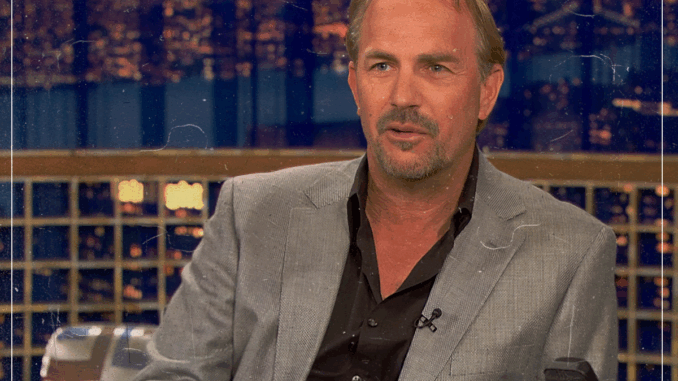
Kevin Costner isn’t just a Hollywood star — he’s a storyteller with a deep respect for the craft of directing. Throughout his legendary career, Costner has worn many hats: actor, producer, director. But behind every decision, every scene, lies inspiration drawn from some of cinema’s greatest visionaries.
Recently, Costner sat down for an intimate discussion about the directors who shaped his approach to filmmaking. From their storytelling styles to their ability to connect with audiences, these influences reveal the artistic soul behind one of Hollywood’s most enduring icons.
A Hollywood Star’s Homage to the Masters of Film
Costner’s career spans decades and genres, but his admiration for certain directors is consistent. He credits them with teaching him not only technical skills but also the importance of emotional truth and narrative depth.
1. Steven Spielberg: The Master of Emotional Storytelling
It’s no surprise that Steven Spielberg tops Costner’s list. The two have worked together on projects like The Post, and Costner praises Spielberg’s ability to blend spectacle with heartfelt emotion.
“Spielberg taught me how to tell stories that feel big but also deeply personal,” Costner shared. “His films remind us why we go to the movies — to feel something real.”
2. Martin Scorsese: The King of Character-Driven Drama
Costner admires Scorsese’s intense focus on character complexity and moral ambiguity. For Costner, Scorsese’s films are lessons in how to dive deep into the human psyche.
“Scorsese’s work challenges audiences and actors alike. It’s raw, authentic, and fearless,” Costner said. “That inspired me to take risks with my own roles and projects.”
3. Clint Eastwood: The Quiet Power of Simplicity
Known for his no-nonsense approach, Clint Eastwood’s directing style emphasizes clarity, pacing, and understatement. Costner respects Eastwood’s ability to deliver powerful stories without unnecessary embellishment.
“Eastwood’s direction shows that sometimes less is more. You don’t always need flashy effects or complex camera work to tell a good story,” Costner explained.
4. Robert Redford: The Artistic Visionary
As both an actor and director, Robert Redford balances artistic integrity with commercial appeal — a balancing act Costner admires deeply.
“Redford taught me the value of staying true to your vision, even when the industry pushes you in other directions,” Costner noted.
5. Francis Ford Coppola: The Epic Storyteller
Costner cites Coppola’s Godfather trilogy as a prime example of epic storytelling combined with intimate character development.
“Coppola’s work shows how to build a world that feels real and immersive while telling a personal story,” Costner said.
How These Directors Influenced Kevin Costner’s Own Work
It’s one thing to admire these directors, but Costner took their lessons to heart, influencing his own directing and acting style.
Applying Spielberg’s Emotional Depth
In films like Dances with Wolves and Open Range, Costner weaves emotional nuance with sweeping storytelling — a nod to Spielberg’s influence.
Embracing Scorsese’s Complexity
Costner’s roles often explore moral dilemmas and character flaws, much like Scorsese’s films. This depth adds layers that keep audiences hooked.
Channeling Eastwood’s Minimalism
Costner’s directing style often emphasizes natural landscapes, quiet moments, and straightforward storytelling, reminiscent of Eastwood’s approach.
Redford’s Influence on Artistic Integrity
Costner has spoken about the importance of staying true to his artistic vision, even when commercial pressures mount, a value clearly inspired by Redford.
Epic Storytelling à la Coppola
Costner’s passion projects show his love for epic narratives with emotional heart, a hallmark of Coppola’s masterpieces.
Why Kevin Costner’s Inspirations Matter to Fans and Filmmakers
Understanding who inspired Costner helps fans appreciate the depth and craft behind his work. For aspiring filmmakers, it’s a roadmap on how to blend influence with originality.
The Evolution of a Hollywood Legend
Kevin Costner’s journey reflects a respectful student turned master. He’s taken cues from giants, yet forged a style that’s unmistakably his own — one that balances heroic storytelling with human vulnerability.
Conclusion: A Legacy Built on Inspiration and Innovation
Kevin Costner’s acknowledgment of these legendary directors highlights the importance of mentorship and inspiration in the creative world. His career is a testament to how learning from the greats can help build your own enduring legacy.
FAQs
1. Which directors influenced Kevin Costner the most?
Steven Spielberg, Martin Scorsese, Clint Eastwood, Robert Redford, and Francis Ford Coppola are among the directors Costner cites as key inspirations.
2. Has Kevin Costner worked with any of these directors?
Yes, notably with Steven Spielberg in The Post and Clint Eastwood in Open Range.
3. How has Costner applied these influences in his directing?
He incorporates emotional depth, character complexity, and simplicity in storytelling, reflecting lessons from these directors.
4. Does Kevin Costner consider himself a director as well as an actor?
Absolutely. He has directed several films, including Dances with Wolves and Open Range.
5. What can aspiring filmmakers learn from Kevin Costner’s inspirations?
To study great directors, embrace storytelling authenticity, and stay true to their artistic vision.
